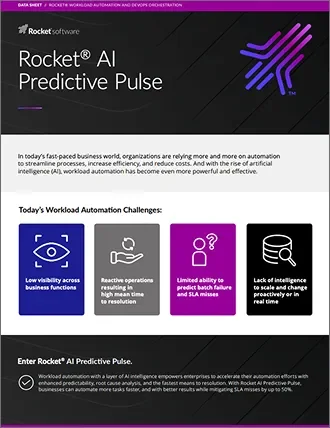Predict SLA Breaches Before They Happen with AI
Predicting and preventing SLA breaches before they happen is now possible with AI. Service Level Agreements (SLAs) are the backbone of any successful IT operation, but meeting them in complex IT environments is a daunting challenge. Frequent SLA breaches lead to financial loss, reputational damage, and eroded customer trust. AI-powered predictive analytics can help IT teams move from reactive problem-solving to proactive SLA management.
One key tool that has helped numerous organizations reach these goals is Rocket® AI Predictive Pulse, a proven solution predicting and preventing SLA breaches and improving workload automation.
4 hr
average look-ahead time to predict and prevent SLA breaches with AI Predictive Pulse
90 %
accuracy in predicting batch job delays with AI Predictive Pulse
The state of workload automation tools
Workload automation tools and schedulers have long been a staple in IT operations. They automate routine tasks, schedule event-driven workflows, and manage batch jobs. But today’s IT ecosystem is so complex that even these critical tools often lack the predictive observability needed to avoid SLA breaches.
Mergers and acquisitions introduce conflicting workload management solutions. Staff turnover leads to knowledge gaps. While many companies aim to consolidate, they first need complete visibility into how workloads operate to facilitate a smooth transition. How does IT determine which systems are managing which SLAs? How can they plan for changes without disrupting business operations?
The complexity, risk, and cost of changing workload automation solutions often lead organizations to accept the status quo. Instead of preventing SLA breaches, teams react to them—convening experts to solve each issue after it occurs. But even minor delays add up. If just five to twenty team members spend hours each month troubleshooting SLA failures, that’s potentially 40 hours of lost productivity—time that could be spent on business innovation.
If this sounds familiar, it’s time to shift from reactive problem-solving to proactive SLA management. AI can help.
Attended AI vs. unattended AI
There are different kinds of AI, and understanding their roles is crucial for effective SLA management.
- Attended AI requires human input. It generates responses when prompted, like creating code, stories, or answers to specific queries.
- Unattended AI, on the other hand, works autonomously. It continuously monitors workloads, predicts SLA breaches, and takes corrective action—without waiting for human intervention.
For SLA management, unattended AI is the most effective choice. Instead of reacting to SLA breaches after they occur, AI continuously evaluates job dependencies, identifies at-risk workflows, and applies corrective measures to prevent breakdowns before they happen.
How AI predicts and prevents SLA breaches
AI transforms workload management by eliminating surprises and ensuring proactive issue resolution. Here’s how:
- Predictive analytics: AI analyzes historical data to identify patterns and predict SLA breaches before they happen. This allows IT teams to proactively address risks, ensuring higher SLA compliance and faster resolution times.
- Intelligent workload scheduling: AI considers resource availability, dependencies, and SLAs to optimize job scheduling and reduce bottlenecks—freeing IT teams to focus on strategic initiatives.
- Root cause analysis: AI helps pinpoint the root cause of workload disruptions, enabling faster issue resolution and preventing recurring problems.
- Observability and predictability: AI and ML provide deep insights into workload ecosystems. By detecting anomalies in real time and learning from past trends, AI enhances SLA compliance and operational efficiency.
From siloed systems to true observability
To effectively manage SLAs, AI must oversee the entire workload ecosystem. Whether your organization relies on mainframes, open systems, or multiple workload management platforms, AI provides essential visibility and delivers predictive observability across all automation solutions.
AI Predictive Pulse is an unattended AI solution that integrates seamlessly with any of Rocket Software’s workload automation tools. It provides a unified view of workload performance and proactively mitigates SLA risks.
Organizations that have implemented AI Predictive Pulse are already seeing significant benefits:
4-hour average look-ahead time to predict and prevent SLA breaches
Drastic reduction in time to plan for changes—from weeks to hours
90% accuracy in predicting batch job delays
To explore how AI Predictive Pulse can help your organization predict and prevent SLA breaches, download our datasheet or request a demo today.
Resources
5 Signs You Need AI in Workload Management
AI Predictive Pulse Demo
AI Predictive Pulse datasheet
